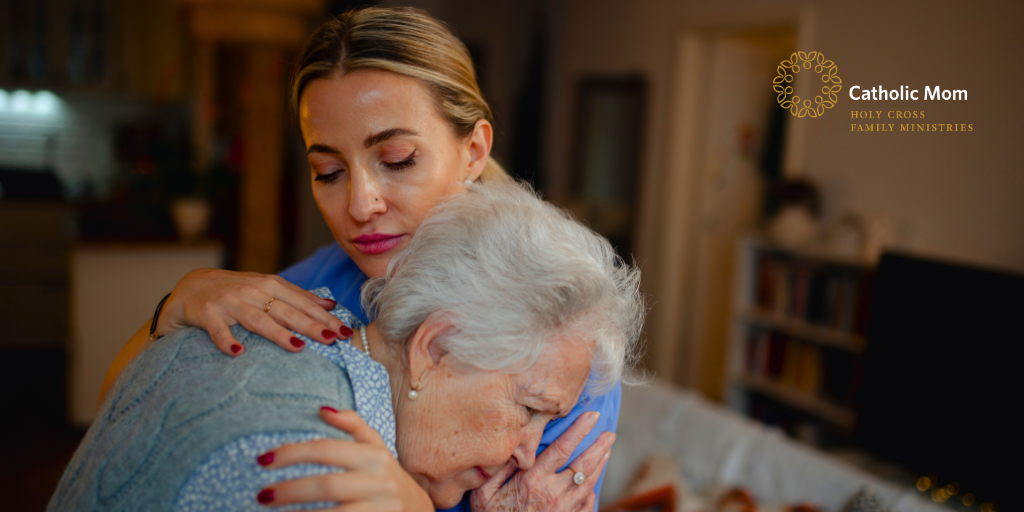
How can we help those who are grieving? Bonnie Drury felt lost, but stumbled onto a few ways.
Lights flashing and an engine’s roar woke my husband and I the other night. A hazmat truck and ambulance were in another cul-de-sac in our condo complex. We knew that the man who lived there had been ill, and also that he had a disabled daughter.
The next morning, my husband walked over to check on them. He’d met the husband, but I didn’t know the couple. He said that a woman opened the door, with tears streaming down her face. Her husband, John, had passed away during the night. What we didn’t know is that their daughter had died two months earlier.
Widows and Orphans
Denny came home shaken, in the face of such raw grief. He asked me to go see her. I resisted, saying, “I’ve never even met her.” Then I remembered Father’s sermon at Mass the night before. The reading was about taking care of widows and orphans.
You shall not wrong any widow or orphan. If you ever wrong them and they cry out to me, I will surely listen to their cry. (Exodus 22:21-22)
This is a pretty powerful warning from the Old Testament. Had I been a comfort to widows and orphans? I knew what I had to do.

The next morning, I walked over. She opened the door to a stranger, but invited me in. We sat at the kitchen table together and she talked, and we cried together. When I got up to leave, I asked how I could help. “I want to stay busy and do everything myself,” she said, “but I’d sure appreciate your prayers.”
Sometimes we say to ourselves, "All I can do is pray," but prayer is powerful.
There are different ways to step into someone else’s grief. And sometimes, we simply need to step back when the newly-bereaved needs the silence of Our Lord’s comfort. The first person to officially die of COVID-19 in California was our dear friend, Bill. He died a week before we were to be witnesses to the Church’s blessing of his marriage to his beloved wife, Margaret. We tried to be there for her in her grief, but she said, “I love you both, but it hurts too much to see you. You remind me of what could have been.”
Different Kinds of Grief
Grief is the experience of coping with loss. We usually think of it as the loss of a loved one, but grief can accompany any event that disrupts our lives. I remember when my dad was placed on hospice care, and the nurse spoke of anticipatory grief. My father was anticipating his own death and deeply grieving the fact that his beloved wife of 74 years rejected him in her dementia.
My sister lived four states away and asked, “What can I do? I feel helpless.”
I told her that after I left for the day, our brother went into his room to drink. Mom was in a care facility, out of Dad’s reach. “That’s when he feels most lost. A phone call would ease his loneliness.”
Reaching Out
She kept her word and called him every night between 7 and 8. It was the highlight of his day. My sister began to ask questions about his life and wrote down his responses. It not only helped him to remember happier times, but when he died, she’d written his life story to share with the family. What a blessing and a gift.
People who are grieving often describe emotions as “coming in waves, often without warning.” What can we do?
Reach out with a phone call or visit. Try not to say, “It’s God’s will,” or “It’s for the best.” Leave that judgment up to the bereaved.
It’s probably better to listen than to give advice. Sometimes the bereaved one just needs to talk. Don’t be afraid to mention the person who’s passed on. It opens the way for them to bring up memories and special times. Don’t say “You’re so strong,” when they’re barely hanging on by a thread.
Grief Is a Part of Life
Grief and sorrow are a part of the life God has given us. Jesus didn’t even spare His own Mother, as we see in the Seven Sorrows of Mary.
Scripture has the best advice on grief:
“So you also are now in anguish. But I will see you again and your hearts will rejoice, and no one will take your joy away from you.” (John 16:22)
He will wipe away every tear from their eyes, and there shall be no more death or mourning, wailing or pain, [for] the old order has passed away. (Revelation 21:4)

We have these promises to comfort us and others. We will all experience grief, but have been promised that it will pass and there will be inconceivable joy.
Share your thoughts with the Catholic Mom community! You'll find the comment box below the author's bio and list of recommended articles.
Copyright 2025 Bonnie Drury
Images: Canva
About the Author

Bonnie Drury
Bonnie Drury is a convert to the Catholic faith. It was a hard-fought battle, but God won. She has five sons and has been married to Dennis the Menace for a long time. She quickly learned through her job as a Child Support Officer that faith is the only answer in these troubled times. Follow Bonnie on Facebook.


.png?width=1806&height=731&name=CatholicMom_hcfm_logo1_pos_871c_2728c%20(002).png)
Comments